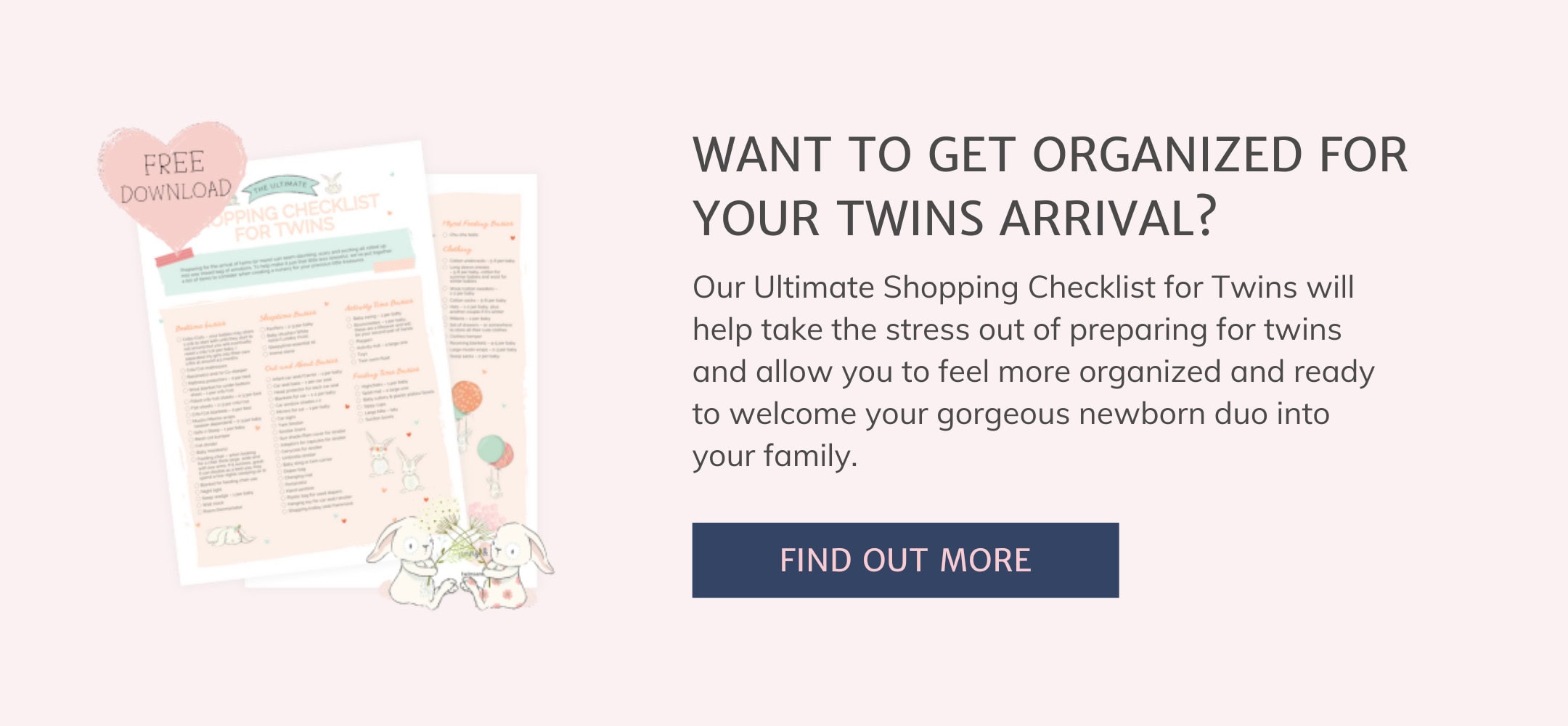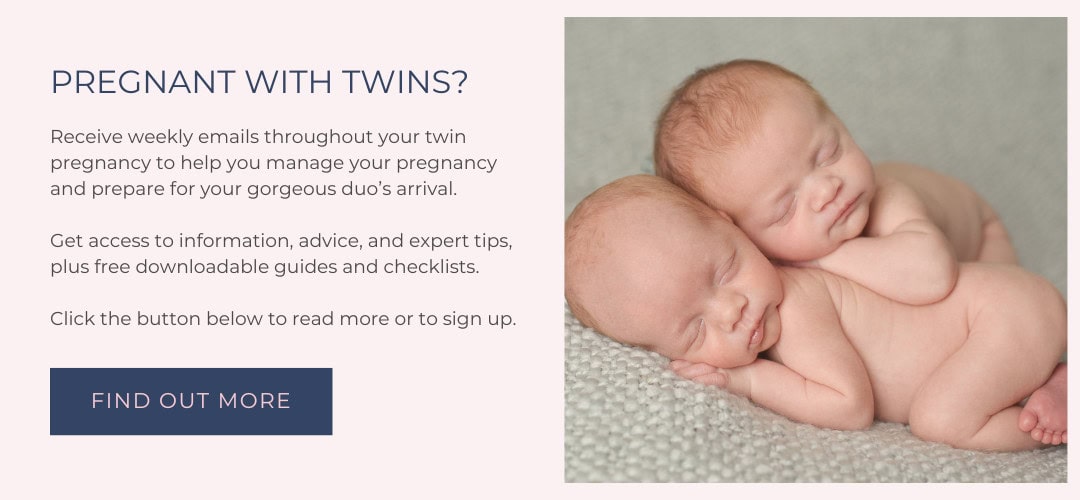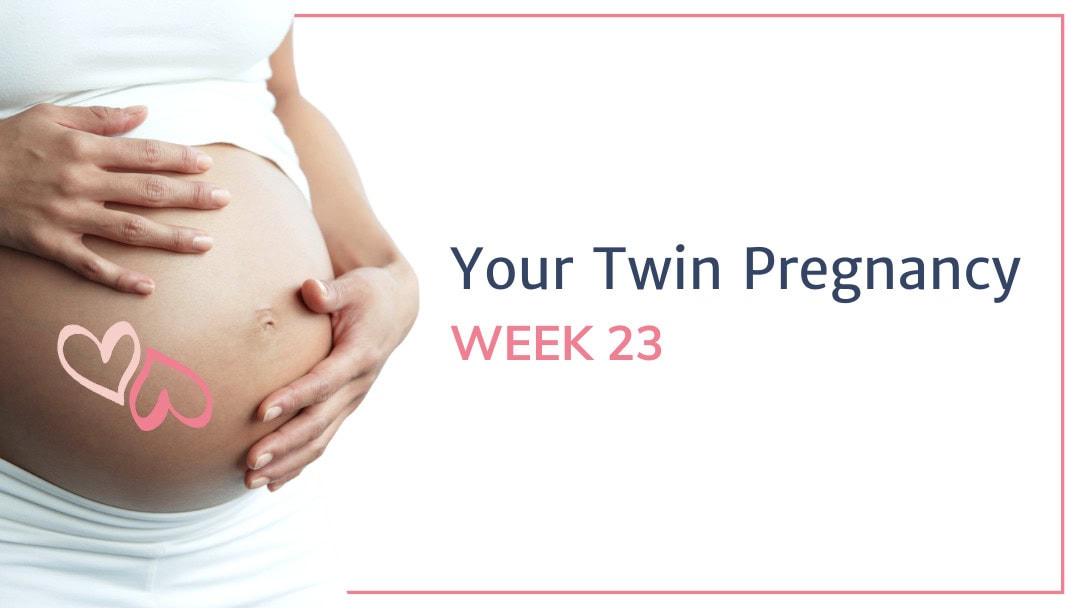Well, hello there, soon-to-be twin mama! Can you believe you’re already at week 23 of your twin pregnancy? Time flies, but your body might be starting to slow down a bit as you get further along. Carrying two babies is no small feat, and by now, you may be feeling more of the physical and emotional strain.
This is also a time when many twin moms start thinking seriously about maternity leave. How much longer should you work? When is the best time to take a break? What should you prioritize to keep yourself and your babies safe and healthy?
This week is a long one as we’re going to dive into the important topic of preparing for maternity leave, along with managing the growing demands of a twin pregnancy. You’ll also get some tips on handling travel, stress, and keeping that all-important blood pressure in check.
So go grab a cuppa, and let’s get started!

How are you feeling mama?
Twin Pregnancy Symptoms at 23 Weeks
As you reach the 23rd week, you’re likely feeling more of the typical pregnancy discomforts—times two! The extra weight, changes in your body, and increasing fatigue can make things more challenging. Here are a few common symptoms and some advice on managing them as you approach your maternity leave:
- Backaches and Pains: With two babies growing, it’s natural to feel more strain on your back and hips. Try using a maternity belt for extra support, and remember to stretch regularly. Prenatal yoga can work wonders!
- Swelling: You may notice more swelling in your hands, feet, and ankles. Stay hydrated and elevate your feet whenever possible. Compression socks can help too!
- Braxton Hicks Contractions: These “practice” contractions might start to become more noticeable. If they’re painful or frequent, it’s always a good idea to talk to your doctor.
What are your twins up to this week?
Your Twins at 23 Weeks – Height & Weight
At this point, your babies are about the size of large mangoes, measuring around 11.4 inches (29 cm) and weighing approximately 1.1 pounds (500 grams) each.
Your Twins’ Fetal Development at 23 Weeks
At 23 weeks, your babies are going through some exciting developmental changes! Their senses are becoming more refined, especially their sense of movement. If you’ve been active, you might notice they become more still, but when you relax, they often start kicking around more. Their ears are also maturing, and they’re beginning to hear sounds from both inside your body, like your heartbeat, and outside, such as voices or music.
Your twins’ skin, while still translucent, is starting to develop a protective layer of fat known as brown fat. This will help them regulate their body temperature after birth. Additionally, their lungs are continuing to develop, and tiny air sacs called alveoli are forming. Although they won’t be ready for breathing until later in pregnancy, these developments are crucial steps toward their ability to breathe on their own once they are born.
Inside their mouths, tiny taste buds are becoming more sensitive, and their digestive systems are practicing the motions needed to process food. Their little fingers and toes are fully formed, and they even have unique fingerprints now! Every week, they’re growing stronger and more ready for the outside world.

What You Might Be Wondering About This Week
As you prepare for maternity leave and navigate week 23 of your twin pregnancy, you likely have a lot on your mind!
With two babies on the way, the decisions you make now—especially regarding work, health, and planning for their arrival—can feel overwhelming. Let’s dive into some common questions and concerns you might be facing this week:
When Is the Best Time to Start Maternity Leave with Twins?
It is generally recommended to finish working at around 28-30 weeks with a twin pregnancy. This might surprise you as most moms don’t finish work until 1-2 weeks before their due date.
But for you mama… it’s very different.
By 29 weeks pregnant, you will be the size of a full-term singleton pregnancy – crazy, hey.
You will feel tired and quite possibly sore. Carrying twins is hard on your belly and hips. You will definitely be perfecting your pregnancy waddle by then.
It is also worth remembering that even a healthy twin pregnancy is classed as high-risk. Your babies need you to rest and try to remove as much stress as possible from your days. The type of ongoing stress that a work environment can cause has been identified as a potential cause of premature births. Twins are already 50% more likely to arrive prematurely, so minimizing this risk is essential to your babies.
Your obstetrician will be able to advise you on your particular pregnancy needs.
READ MORE: Your Twin Pregnancy – When Should you Finish Work.
Signs It’s Time to Slow Down at Work During a Twin Pregnancy
At 23 weeks, you may be feeling more fatigued or experiencing discomfort like back pain and swelling, which can be more pronounced with twins. These can be signs that it’s time to slow down or consider reducing your work hours. If you’re struggling to focus, feeling physically exhausted, or noticing an increase in Braxton Hicks contractions, it’s worth talking to your healthcare provider about whether it’s time to transition to lighter duties or start maternity leave early.
Talking to Your Employer About Twin Pregnancy and Maternity Leave Plans
Having an open conversation with your employer about your maternity leave is important, especially since carrying twins may require you to stop working earlier than expected.
Approach this discussion with a clear plan—explain the medical reasons why twin pregnancies often require more rest and outline how you can help transition your responsibilities to colleagues. Being proactive about the handover process can ease any concerns and make for a smoother exit from work.
Setting Up a Work Handover Plan Before Taking Maternity Leave
To make your time away as seamless as possible, it’s a good idea to set up a comprehensive handover plan before you leave. Start by organizing your tasks and prioritizing what needs to be done before you go.
Delegate projects to coworkers, train replacements, and leave clear instructions for ongoing responsibilities. The better prepared your team is, the more you can focus on your health and your babies during maternity leave.
Managing Work Stress and Why It’s Important
We all know that stress isn’t great for any pregnancy, but managing work stress during a twin pregnancy is especially critical. Unlike the occasional stress of a busy day, chronic stress can negatively impact your babies’ development. Elevated stress levels can lead to high blood pressure, increase the risk of preterm labor, and affect fetal growth.
Stress isn’t just about what’s happening at work—your body reacts in real-time to your mental and emotional state. Twin pregnancies already place extra demands on your body, so adding stress to the mix can feel overwhelming.
Here’s why managing work stress is different from other types of stress:
- It’s often constant: Work-related stress tends to be ongoing, whereas other forms of stress (like a sudden event) are short-lived.
- It impacts your focus and decision-making: Chronic work stress can cloud your ability to make the best decisions for yourself and your babies.
To manage work stress effectively, consider these tips:
- Delegate when possible: You don’t have to do everything yourself. Hand over tasks to colleagues as your maternity leave approaches.
- Practice mindfulness: Even 5 minutes of deep breathing or meditation can lower stress levels.
- Take breaks: Don’t push through long hours without resting. Your health and the health of your babies come first.
- Set boundaries: This is the time to start scaling back and saying “no” to extra projects or tasks.
Managing Guilt or Anxiety About Leaving Work Earlier with Twins
It’s common to feel a sense of guilt or anxiety about leaving work earlier than planned, especially if you’re used to a busy, fast-paced job. You might worry about unfinished projects or how your absence will impact the team.
However, it’s important to remember that your health and that of your twins comes first. Prioritizing your well-being is essential, and taking time off when needed ensures you’ll be better prepared for the challenges of twin motherhood ahead.
Financial Considerations: Planning for an Early Maternity Leave
Starting maternity leave earlier than expected can raise financial concerns, especially if your company’s leave policy doesn’t fully cover extended time off. Now is the time to review your maternity leave benefits, short-term disability options, and any income gaps you may need to prepare for.
Setting a budget now can help alleviate stress later. Look into government benefits, savings strategies, or other sources of financial support so you’re well-prepared when your leave begins.
Navigating Job Flexibility Options: Remote Work or Part-Time Before Full Maternity Leave
If you’re not quite ready to stop working altogether, you might consider negotiating more flexible work arrangements as you approach your due date. Remote work, shorter hours, or transitioning to part-time can help extend your time in the workforce without pushing yourself too hard.
Talk to your employer about what’s possible and explore options that allow you to balance rest with maintaining productivity for as long as you can.
Preparing for Unexpected Twin Arrivals: Why Week 23 Is Key for Maternity Planning
One of the realities of carrying twins is the higher chance of preterm labor. While 23 weeks is still early, it’s important to be prepared for the unexpected, and we will go into more about this next week.
Start thinking about how you’ll handle things if your twins arrive sooner than planned. This includes finalizing your maternity leave plans, packing a hospital bag early, and having backup plans for home and work. Being prepared can help reduce stress if things move faster than expected.
Maternity Leave & Paternity Leave with Twins: Coordinating Time Off with Your Partner
Coordinating maternity and paternity leave is especially important when you’re expecting twins. Having your partner’s support during the early weeks can be a huge help when caring for two newborns.
Discussing leave options and timing now can ensure that you both have time to bond with your babies and share the responsibilities of twin parenthood. Some families choose to stagger their leave, while others take time off together—it’s all about finding what works best for your family.
Mental Health Breaks: How to Recharge During the Final Weeks at Work
As you approach your last weeks at work, taking mental health breaks to prevent burnout is crucial. Pregnancy with twins is demanding, both physically and mentally, so make sure you’re giving yourself time to relax and recharge.
Even small things, like taking a 10-minute walk, practicing mindfulness, or simply stepping away from your desk for some fresh air, can make a big difference. Prioritizing your mental well-being now will help set a strong foundation for your maternity leave and beyond.
Travel Safety and Guidelines – Why It’s Different for Twin Pregnancies
At 23 weeks, you might be thinking about taking a “babymoon” or attending a work conference before your maternity leave kicks in. However, travel during a twin pregnancy is different from a singleton pregnancy, and it’s essential to take extra precautions.
With twins, you are at a higher risk for complications like preterm labor, which means that some airlines may restrict travel after a certain point, usually around 28-30 weeks. If you do plan to travel, always check with your healthcare provider first. Here are a few safety tips for traveling during a twin pregnancy:
- Choose short trips over long-haul flights, and if you need to fly, be sure to move around regularly to avoid blood clots.
- Stay hydrated and bring healthy snacks to maintain your energy.
- Avoid destinations with poor medical facilities, just in case you need care.
- Wear compression socks to promote circulation and reduce swelling during the trip.
It’s best to avoid unnecessary travel after week 28, as your risk for preterm labor increases.
Dealing with Aches and Pains
Backaches, pelvic pressure, and leg cramps are common in twin pregnancies, especially around this stage. Here are a few practical ways to alleviate some of these discomforts:
- Maternity support belts can help alleviate pressure on your lower back.
- Prenatal massages can be a great way to reduce muscle tension. Just make sure your therapist is trained in prenatal care.
- Warm baths with Epsom salts (make sure the water is not too hot) can ease sore muscles and help you relax.
- Gentle stretching and prenatal yoga are great ways to keep your muscles limber and reduce pain. Focus on stretches that relieve pressure on your back and hips.
Remember, your body is working overtime to support two babies, so it’s okay to take it easy when needed!
Blood Pressure – Why It’s Important to Keep It Low
Monitoring your blood pressure is crucial during any pregnancy, but it’s especially important when you’re carrying twins. High blood pressure can be an early sign of preeclampsia, a condition more common in twin pregnancies that can lead to complications if left untreated.
Here are some ways to help keep your blood pressure in a healthy range:
- Rest and relax: Try to reduce stress and take frequent breaks, especially as you near maternity leave.
- Stay hydrated: Drinking plenty of water helps regulate blood pressure.
- Limit salt intake: Cutting back on salty foods can help keep your blood pressure in check.
- Regular prenatal check-ups: Your doctor will keep an eye on your blood pressure and may recommend extra monitoring if it’s creeping up.
If you’re concerned about your blood pressure, talk to your doctor. They may suggest extra rest or prescribe medication to keep things under control.
Before you go…
As you enter week 23 of your twin pregnancy, it’s normal to feel a mix of excitement, anticipation, and maybe even a little nervousness. Preparing for maternity leave, managing work, and focusing on your health can be overwhelming, but remember—you’re not alone, and it’s okay to prioritize your well-being. The journey of carrying twins is unique, and it’s essential to listen to your body, slow down when needed, and make decisions that are best for you and your babies.
Whether you’re planning your maternity leave, managing stress, or dealing with the physical demands of pregnancy, taking these steps now will help ensure a smoother transition into motherhood. Don’t forget to lean on your support system—your partner, family, friends, and medical team are all there to help you along the way. You’re doing an amazing job, mama, and every decision you make to care for yourself is a decision that benefits your babies, too.
Take it one day at a time, trust your instincts, and know that you are strong and capable. Your twins are lucky to have you, and soon enough, you’ll be holding them in your arms, ready to start this next beautiful chapter of your life.
You’ve got this!

P.S. Want to receive a reminder email to come back and read the next post in this Twin Pregnancy series? Register for our Twin Pregnancy & Preparing for Twins emails, and it will drop straight into your inbox.


